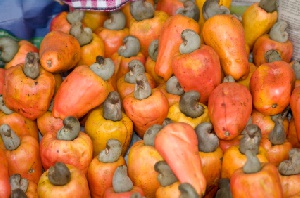The total export revenue realized from cashew in 2016 was US$244,500,000, making the commodity the leading non-traditional crop export revenue generator.
The President of the Ghana Cashew Industry Association, Winfred Osei Owusu, disclosed this to the Business and Financial Times on the sidelines of a field visit to cashew farms at Wenchi in the Brong Ahafo Region.
He said the quantity of raw cashew nuts exported from the country in 2016 was 163,000 metric tonnes, which positions Ghana as one of the leading exporter of the commodity onto the international market.
Ghana produces between 50,000 to 70, 0000mt of raw cashew nuts annually, but it exports far more than that figure. Mr. Owusu attributed it to the conducive business environment in the country, thus making Ghana a preferred destination in the Sub-Region for cashew traders across the world.
Checks by the B&FT revealed that most of the exporters buy cashew from Cote d’Ivoire via border posts at Sampa andAtuna in the Brong Ahafo Region. Though the Ivorian government in 2013 banned trans-border trade of cashew, but the desperate traders are able to manoeuver their way out.
He urged the government to capitalise on Ghana’s competitive edge in the cashew tradeas well as the hot demand for the commodity on the international market to develop the industry into a more viable avenue for economic transformation.
“There is over two million metric tonne demand gap on the international market. Ghana can take advantage of this huge opportunity once we have the glaring potential to do so. Currently, cashew trades better than cocoa on the international market. In the last 5-6 years, the price of cashew has increased by 700% and it is still rising,” he indicated.
He said cashew is selling (FOB) on the international at US$2,200 per metric tonne as against cocoa which is pegged at US$2,100 at the same quantity. “Consistently, cashew has over the past six years seen price increase worldwide, so the trend shows that it is a crop that can generate more revenue when giving the necessary support.”
Current state of cashew industry
Of the 13 cashew processing factories in the country, only three are currently operational, the rest have all shut down. The three factories in business are those owned by foreigners. The total installed capacity of the 13 factories is around 62,000 metric tonnes but the utilization level is only 15,000 metric tonnes.
High cost of cashew raw nuts (RCN) is prominent among the factors that have forced all the Ghanaian-owned processing plants to shut down. The price of RCNper kilogramme is US$1.56 equivalent to GH¢7 while a metric tonne price hovers around US$1,555.
Other factors militating against the cashew industry include lack of access to working capital and elusiveness of modern technology and equipment by industry players.
Mr. Owusu stated that cashew as an export crop provides a very good avenue for the government to make more revenue from it. As a rural economic transformational commodity which has attract about twelve companies to the Brong Ahafo Region,this is one area the government can look at by assisting such companies under its ‘One district, one factory’ initiative to create more jobs;cashew is also perfect for the planting for food and jobs policy, he added.
Financing of cashew industry
On his part, an industry player, John Addauay lamented at the prevailing interest rates, saying they are inimical to the growth of the industry.” He said ‘if you have a strategic crop that can create employment and bring development to rural areas and sub-urban drift; I think it is worth for government to institute soft concessionary loan package for a period of about 4-5 years.’
He also called for a ‘push’ to get the cashew fruit processed into drinks or food. The focus has always been on the nuts but the fruit which is about five times the quantity of nuts goes waste. This can generate more income for the farmers when processed, he stated.
Mr. Anthony Kwaku Adu, National President of Cashew Farmers Association proposed the reintroduction of cashew development project which was implement from 2001to 2009 by the Ministry of Food and Agriculture. He said the development of cashew in the country now is the fruit of that project. “Framers are ever prepared to cultivate more with the little support from the government.”
Business News of Monday, 20 March 2017
Source: thebftonline.com

















